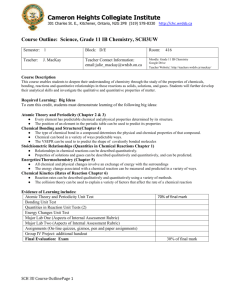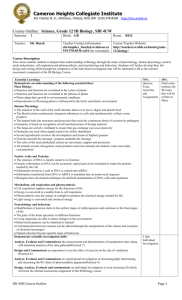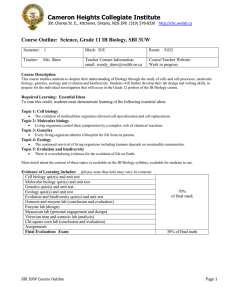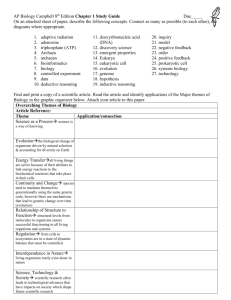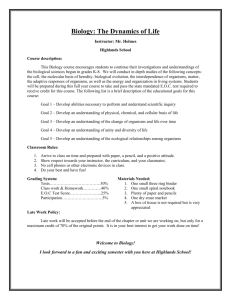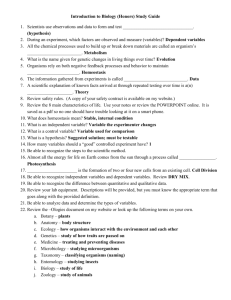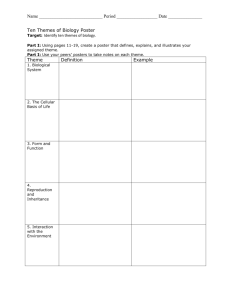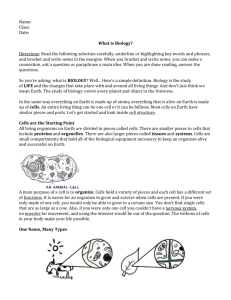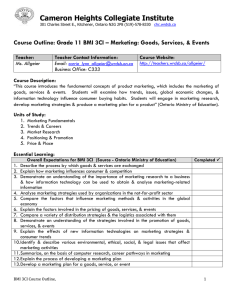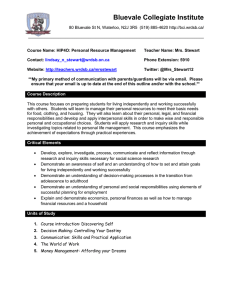Course Outline: Science, Grade 11 IB Chemistry, SCH3UW
advertisement
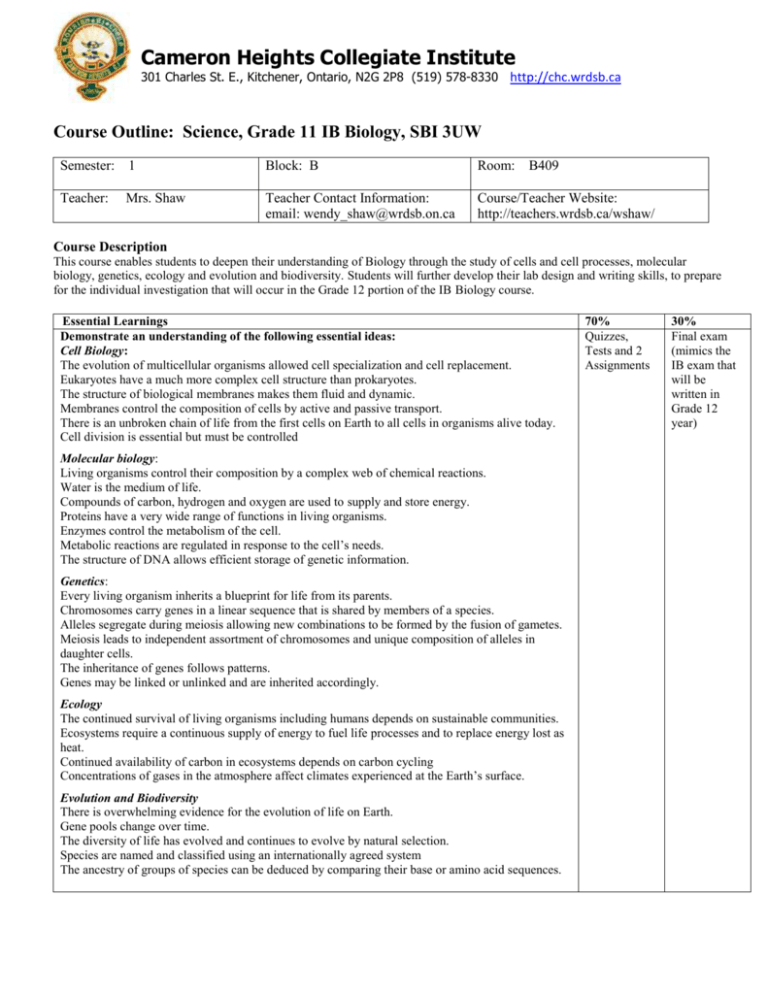
Cameron Heights Collegiate Institute 301 Charles St. E., Kitchener, Ontario, N2G 2P8 (519) 578-8330 http://chc.wrdsb.ca Course Outline: Science, Grade 11 IB Biology, SBI 3UW Semester: 1 Block: B Room: Teacher: Teacher Contact Information: email: wendy_shaw@wrdsb.on.ca Course/Teacher Website: http://teachers.wrdsb.ca/wshaw/ Mrs. Shaw B409 Course Description This course enables students to deepen their understanding of Biology through the study of cells and cell processes, molecular biology, genetics, ecology and evolution and biodiversity. Students will further develop their lab design and writing skills, to prepare for the individual investigation that will occur in the Grade 12 portion of the IB Biology course. Essential Learnings Demonstrate an understanding of the following essential ideas: Cell Biology: The evolution of multicellular organisms allowed cell specialization and cell replacement. Eukaryotes have a much more complex cell structure than prokaryotes. The structure of biological membranes makes them fluid and dynamic. Membranes control the composition of cells by active and passive transport. There is an unbroken chain of life from the first cells on Earth to all cells in organisms alive today. Cell division is essential but must be controlled Molecular biology: Living organisms control their composition by a complex web of chemical reactions. Water is the medium of life. Compounds of carbon, hydrogen and oxygen are used to supply and store energy. Proteins have a very wide range of functions in living organisms. Enzymes control the metabolism of the cell. Metabolic reactions are regulated in response to the cell’s needs. The structure of DNA allows efficient storage of genetic information. Genetics: Every living organism inherits a blueprint for life from its parents. Chromosomes carry genes in a linear sequence that is shared by members of a species. Alleles segregate during meiosis allowing new combinations to be formed by the fusion of gametes. Meiosis leads to independent assortment of chromosomes and unique composition of alleles in daughter cells. The inheritance of genes follows patterns. Genes may be linked or unlinked and are inherited accordingly. Ecology The continued survival of living organisms including humans depends on sustainable communities. Ecosystems require a continuous supply of energy to fuel life processes and to replace energy lost as heat. Continued availability of carbon in ecosystems depends on carbon cycling Concentrations of gases in the atmosphere affect climates experienced at the Earth’s surface. Evolution and Biodiversity There is overwhelming evidence for the evolution of life on Earth. Gene pools change over time. The diversity of life has evolved and continues to evolve by natural selection. Species are named and classified using an internationally agreed system The ancestry of groups of species can be deduced by comparing their base or amino acid sequences. 70% Quizzes, Tests and 2 Assignments 30% Final exam (mimics the IB exam that will be written in Grade 12 year) Cameron Heights Collegiate Institute 301 Charles St. E., Kitchener, Ontario, N2G 2P8 (519) 578-8330 http://chc.wrdsb.ca Demonstrate scientific investigation skills: 4 labs Analyse, Evaluate and Communicate the estimation of osmolarity in tissues by bathing samples in hypotonic and hypertonic solutions. (Practical 2) Design and Communicate an experiment to test the effect of temperature, pH and substrate concentration on the activity of enzymes. Analyse, Evaluate and Communicate an experimental investigation of a factor affecting enzyme activity.(Practical 3) Design and Communicate the setting up sealed mesocosms to try to establish sustainability. (Practical 5) Practical Skills: Use of a light microscope to investigate the structure of cells and tissues, with drawing of cells. Calculation of the magnification of drawings and the actual size of structures and ultrastructures shown in drawings or micrographs. (Practical 1) Biological drawing assignment Tests Course Evaluation Throughout the course, teachers will gather evidence of student learning through observations, conversations, and studentproduced work. Seventy percent (70%) of the final mark will come from term work, and thirty percent (30%) will come from final evaluations. Report card grades will reflect the student’s most consistent level of achievement, with consideration given to more recent evidence. Learning Skills The Learning Skills and Work Habits section of the provincial report card is an integral part of a student’s learning. Students will be assessed in the following areas: Responsibility Independent Work Organization Initiative Collaboration Self-Regulation The following scoring system is used for Learning Skills: E=Excellent; G=Good; S=Satisfactory; N=Needs Improvement Course Materials In order to be successful it is important to be organized and prepared for each class. You will be expected to have the following items with you in class each day: Pens, pencils, ruler and calculator (cell phones and other electronic devices are not permitted) Binder with plenty of lined paper Biology Course Companion textbook, 2014 ed. Labs and assignments are expected to be completed using a computer, and a working knowledge of software such as Word and Excel is needed. Sometimes internet access is required and although students have access to computers at the school, these resources are often limited. Absences Absences must be validated and missed work completed outside of class time. If you miss a unit test or major lab for a valid reason, be prepared to complete it on the day you return. It is your responsibility to find out what you missed and catch up after being absent. If you know ahead of time about an absence make arrangements beforehand! Extra help is available– your teachers are pleased to assist you! The Science Office is Room F434; please make arrangements with your subject teacher or visit tne peer tutoring in room A202 if extra help is needed. For more information about the content of this course outline, please consult: Higher Level IB Biology syllabus (available in class and online) WRDSB’s Administrative Procedure 1660 (Assessment, Evaluation and Reporting) The appropriate CHCI teacher or administrator
